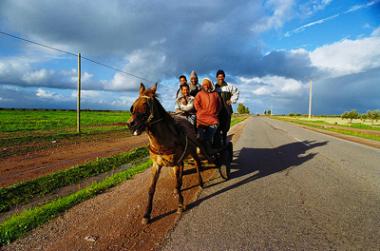Improving Road Maintenance in Morocco

Summary
Morocco has set an ambitious goal for road improvement in its Road Strategy for 2015-2035: raise the proportion of roads in adequate condition from the current 54 percent to 80 percent by 2035. A key component for achieving this goal is to place a stronger emphasis on road maintenance and a more efficient use of the private sector for this maintenance through performance-based-contracts. The concept — allowing to transfer the responsibility of maintenance and performance standards to the private sector — was, however, relatively new to Morocco, since much of its routine road maintenance is still done “in-house” by public sector transportation agencies. Other countries have successfully used performance-based contracts for road maintenance. Uruguay and Argentina are among the countries having demonstrated success with performance-based contracts and where Morocco seized an opportunity for a knowledge exchange.
In May 2014, a Moroccan delegation comprising senior officials from the Ministry of Transport and the Road Directorate visited Uruguay and Argentina where they met with senior representatives from respective Ministry of Works and road agencies. Through discussions with key officials who introduced and manage the road networks based on the performance-based-contracts concept, the Moroccan officials learned about the valuable experience of these countries to better maintain their road networks and how to successfully design and introduce a performance-based approach to road maintenance in Morocco. The Moroccan delegation also met with private sector representatives to learn more about the challenges local companies faced when the concept was introduced.
To disseminate the knowledge from the exchange, Morocco's Road Directorate organized a workshop in October 2014 with participation from Regional Directorates and the World Bank. A brochure describing performance-based contracts and the experiences in Uruguay and Argentina was prepared for the workshop. There has also been a continued dialogue between Morocco and its South American counterparts following the study tour.
What results have been achieved?
The study tour substantially enhanced the participants' knowledge of the use and application of performance-based contracts. A decision was taken to introduce performance-based contracts in Morocco, followed by a pilot project based on the good practice approach gained from the knowledge exchange and from tools, such as standard bidding documents, guides, and technical standards provided by the World Bank. To help operationalize the concept and address the broader issue of maintenance of the road network in Morocco, discussions took place with the Moroccan authorities on further World Bank support, including through potential lending.
There is now a clear willingness by key decision-makers in Morocco to address the issue of maintenance, which, in effect, translates into sustainability of investments in the road sector. The improved sustainability and management of Morocco's road network will contribute to lower transportation costs, a strong factor in economic growth, increased employment, and better access to services and markets.
The study tour substantially enhanced the participants' knowledge of the use and application of performance-based contracts. A decision was taken to introduce performance-based contracts in Morocco, followed by a pilot project based on the good practice approach gained from the knowledge exchange and from tools, such as standard bidding documents, guides, and technical standards provided by the World Bank. To help operationalize the concept and address the broader issue of maintenance of the road network in Morocco, discussions took place with the Moroccan authorities on further World Bank support, including through potential lending.
There is now a clear willingness by key decision-makers in Morocco to address the issue of maintenance, which, in effect, translates into sustainability of investments in the road sector. The improved sustainability and management of Morocco's road network will contribute to lower transportation costs, a strong factor in economic growth, increased employment, and better access to services and markets.

 China
China Colombia
Colombia Denmark
Denmark India
India Indonesia
Indonesia Mexico
Mexico Russian Federation
Russian Federation Spain
Spain United Kingdom
United Kingdom